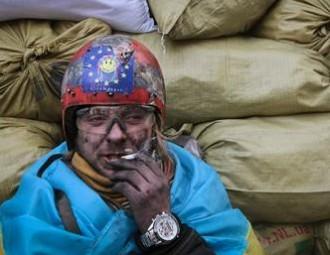Vladimir Kuprij: Third sector has become the centre of the anti-separatist protests in Ukraine

What is happening with Ukraine’s civil society? Are there any strong organizations, which support separatists? Can NGO influence the situation in the south-eastern regions of Ukraine?
His opinion on these issues with the “EuroBelarus” Information Service shared Vladimir Kuprij, the coordinator of the first working group of the Ukrainian National Platform of the Eastern Partnership Civil Society Forum.
- Civil society in Ukraine is developing dynamically, de-facto turning into an agent of changes in Ukraine. The outburst of people’s self-organization, which we were noting during the Maidan, serves as a good basis for the activation of civil society organizations. The appearance of new public figures and activists actualizes the necessity of democratic education, as well as the monitoring of authorities’ actions and advocacy of changes in the local and state policies.
For now there are no influential and important third sector organizations, which would be are supporting separatists. Mostly these are marginal groups or small organizations, which mostly don’t have the legal status of public organizations. Their “activation” only happened because they were used as disguise for some people’s initiative.
On the other hand, mass media had their hand in creating the image of real organizations, which they had never been. For example, the “Right sector”: juridically, there is no such registered public organization with such name and there had never been before.
We also should bear in mind that thanks to the external influence special organizations were formed for all these events (like “Ukrainian choice”, “Young guard”, “Eurasian union of youth”). These organizations have been performing fully political functions and were aimed at undermining the situation and stimulating separatism under the disguise of the fight on terrorism. Using the methods they disapprove of, these organizations have been demonstrating their real goals.
But yet again, it should be noted that these movements have never appeared in result of the grassroots initiative; they were rather inspired by the state authorities and intelligent services of Ukraine’s neighboring state. The funding of such structures was non-transparent; they were used as a means of propaganda, rather than the organizations which support the rights of citizens and champion their interests.
It should be noted that the third sector at the south-eastern Ukraine is rather strong: it has quite a number of different organizations, which are actively working in a variety of spheres: from advocacy to the provision of social services. Basically, it is the third sector that has become the centre of the public actions, anti-separatist protests, solidarity demonstrations and support of Ukraine’s unity with broad decentralization.
-
03.01
-
07.10
-
22.09
-
17.08
-
12.08
-
30.09








































